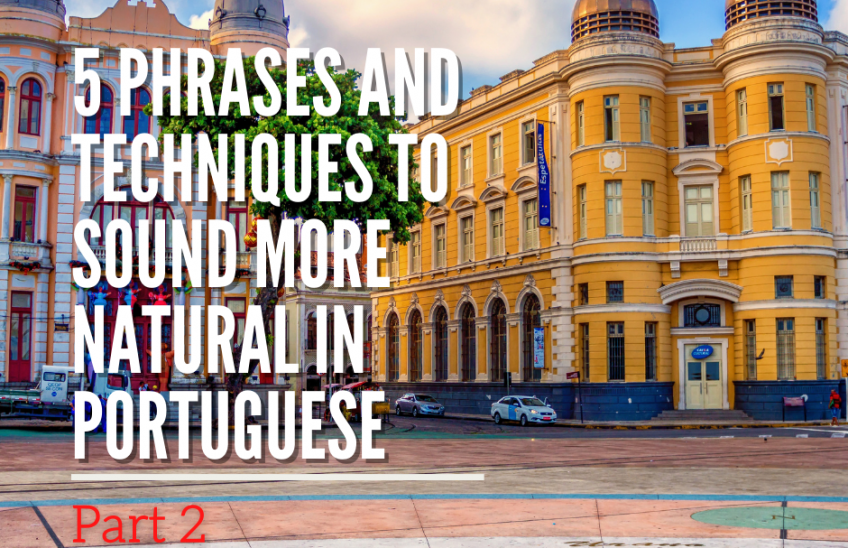Oi! Tudo bem? In our last article, we learnt 5 things we can do to sound more natural in Brazilian Portuguese (if you haven’t checked it out yet, click here). There are still so many things you can do and today we’ll be teaching you 5 more! Remember that you don’t need to follow all of these steps to speak Portuguese and you’ll still be perfectly understood by natives! These are just some tips!
1 – Say “Brigado/Brigada” instead of “Obrigado/Obrigada”
“Thank you” in Portuguese can be very informal! We usually cut off the letter “o” in “obrigado” when pronouncing it. You can also say “valeu” as it’s very colloquial and it’s frequently used among Brazilians.
a) Brigada pelo presente! (Thanks for the gift)
b) Brigado por vir! (Thanks for coming)
c) Valeu pela ajuda (Thanks for the help)
2 – Abbreviate the verb “Estar”
| Presente do Indicativo | Pretérito Perfeito | Pretérito Imperfeito | |
| Eu | Estou – tô | Estive – tive | Estava – tava |
| Você | Está – tá | Esteve – teve | Estava – tava |
| Ele, Ela | Está – tá | Esteve – teve | Estava – tava |
| A gente | Está – tá | Esteve – teve | Estava – tava |
| Nós | Estamos – tamos | Estivemos – tivemos | Estávamos – távamos |
| Vocês | Estão – tão | Estiveram – tiveram | Estavam – tavam |
| Eles, Elas | Estão – tão | Estiveram – tiveram | Estavam – tavam |
We can perfectly say “Eu estou com fome”, but in colloquial Portuguese, we often abbreviate this verb in the present and past tenses.
Examples:
- Eu tô com calor (I’m feeling hot)
- Eles tão aqui (They’re here)
- Paulo e Henrique tiveram no Brasil ano passado (Paulo and Henrique were in Brazil last year)
- Nós tamos trabalhando demais (We’re working a lot)
- O que vocês tavam fazendo? (What were you doing?)
- A festa tava muito boa! (The party was so good!)
3 – Use the Augmentative and the Diminutive
Augmentative is when we change a word by emphasising its size or its quality. It’s compounded by the suffix -ão and –ona. For example, we could say “Eu tenho um carro incrível” (I have an amazing car), but it’d sound even more natural if we said “Eu tenho um carrão”. Let’s see some more examples:
- forte (strong – masculine) – fortão (very strong)
- forte (strong – feminine) – fortona (very strong)
- centro (centre) – centrão (big centre)
- um jogo (a game) – um jogão (a great game)
- uma mesa (a table) – uma mesona (a big table)
Regarding the diminutive (It’s composed of the suffixes –inho, –inha, –zinho, –zinha.), we use it when we want to emphasise how small something is, if we wish to show affection, contempt, and if you want to make something sound less serious. There are some other cases but here’s a few:
a) We use –inho and –inha when the last syllable is not stressed. For example:
- Livro (book) – livrinho (little book)
- Casa (house) – casinha (little house)
- Sala (room) – salinha (little room)
- Gato (cat) – gatinho (little cat)
b) We use –zinho and –zinha when the last syllable stressed, if a word has only one syllable, if the last syllable is very nasal, if the last syllable ends in -dade, or if the last syllable ends in -r or -L
- Café (coffee) – cafezinho (small coffee)
- Irmã (sister) – irmãzinha (little sister)
- Mãe (mother) – mãezinha (dear mother)
- Cidade (city) – cidadezinha (little city)
- Mar (sea) – marzinho (little sea)
- Animal – animalzinho (little animal)
- Oi, amorzinho! – Hi, honey! (For somebody you love.)
- Seu bebê é tão bonitinho. – Your baby is so cute. (Showing affection.)
- Vamos tomar uma cerveja bem geladinha. – Let’s have a really nice cold beer. (To emphasise the quality of the adjective)
- Nós temos um probleminha. – We have a small problem. (Often meaning it’s a huge problem.)
- Vou fumar um cigarrinho. – I’m going to smoke just one little cigarette. (Maybe trying to hide a vice.)
- Vou dar uma saidinha. – I’m just going to pop out. (Implying a quick return, which is not always the case.)
4) Start telling stories with “Bom…” and “Então…”
It sounds more interesting to begin telling a story with these two words because not only does it give you time to think about what you’re going to say, but it’ll also make the listener pay attention to you.
a) Bom, ontem eu fui a um pub com meus amigos e foi muito legal! (Well, yesterday I went to a pub with my friends and it was really nice!)
b) Então, eu perguntei pro meu pai se eu poderia ir à festa e ele disse que não. (So, I’ve asked my dad if I could go to the party and he said no)
5) Abbreviate the preposition “para”
We often use “pra” or “pro” when we use this preposition. They can either be the preposition per se or the combination of “para a “ or “para o:
a) Eu falei para o meu pai que eu vou sair – Eu falei pro meu pai que eu vou sair (I’ve told my dad I’m going out)
b) Nós vamos para a praia – Nós vamos pra praia (We’re going to the beach)
c) Ele falou para mim que está se mudando para Minas – Ele falou pra mim que está se mudando pra Minas (He told me he’s moving to Minas)
d) A Ana Júlia deu um presente lindo para o Bernardo – A Ana Júlia deu um presente lindo pro Bernardo (Ana Julia gave a beautiful gift to Bernardo)
And that’s it! Try to use these techniques next time you speak Portuguese! And if you haven’t followed us on Instagram, what’s taking you so long?!
Até mais!
Luciana Veloso

